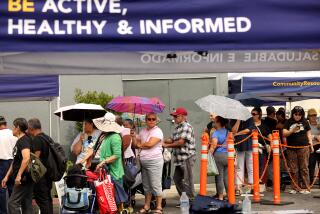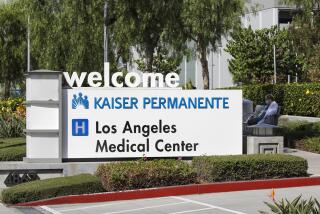Wallet-Size Device Holds 800 Pages of Medical Records : LifeCard Promoter Seeks Support
- Share via
The Maryland promoter of a wallet-size memory card that can hold 800 pages of a person’s medical and insurance records visited Los Angeles on Thursday to try to win support for the new technology from Blue Cross of California--the state’s largest health insurer.
Although equipment to encode and decipher the so-called LifeCard--marketed by Blue Shield of Maryland--won’t be widely available for another six months, the Towson, Md.-based health insurer is trying to drum up support for the device among the nation’s more than 30 Blue Cross and Blue Shield organizations before it undergoes its first market test in November in Columbia, Md.
Seeking Commitments
“We are seeking commitments from Blue Cross and Blue Shield organizations . . . which serve some 90 million people in the United States,” said Thomas A. Sherlock, executive vice president of Maryland Blue Cross and Blue Shield and chairman of Health Management Systems, the subsidiary that markets the LifeCard.
Sherlock said his company has not secured any domestic commitments yet but added that two foreign countries, which he refused to identify, have agreed to use the card.
Developed at a cost of $2 million, the LifeCard can include such information as a digitalized photograph of the card holder, a facsimile of his signature, a description of his health insurance, his physician’s name and phone number, a copy of an electrocardiogram and a chest X-ray and a list of any drug allergies, among other information.
The inch-and-a-half wide digitalized strip on the back of each LifeCard can hold up to 800 pages of information and can be read when scanned by a $1,000 device that is similar to a computer disk drive.
Though the card could potentially prevent writer’s cramp in consumers used to filling out long health insurance forms, its primary benefit is to help hospitals trim their record-keeping and administrative expenses. For California hospitals, those costs totaled $1.5 billion, or 13.4% of their expenses in 1983, according to the California Health Facilities Commission.
The $1.50 plastic cards could prove a financial bonanza for the manufacturer, Drexler Technology of Mountain View, Calif.
5,000 Cards a Day
Drexler, one of the nation’s largest suppliers of micro-imaging products, produces 5,000 digitally encoded cards per day for the Maryland health insurer and also for Wang Laboratories, NCR and Honeywell, which plan to use them for office needs.
President Jerome Drexler said the company, which had sales of $18 million last year, could gross $55 million from the digital cards alone if just 37 million of the nation’s 90 million Blue Cross and Blue Shield members are issued the LifeCard.
As part of the nation’s fourth-largest Blue Cross chapter, the 4.2 million members of Blue Cross of California as well as other large chapters in New York and Illinois could be crucial to the LifeCard’s ultimate success.
Blue Cross of California officials could not be reached for comment after Thursday’s meeting to determine when they might make a decision about the LifeCard. Blue Cross of California spokesman Larry Rodriggs said that, although his company has been evaluating the LifeCard “for several months. . . . We don’t have any specific plans about implementing it. It’s not a short-term goal at the present time.”
Charles L. Parcell, a vice president at Blue Shield of California, which has 1.5 million members, said his company is interested in the LifeCard and plans to “take a closer look at it.”
But Parcell and other insurance officials expressed concern about the potential cost, complexity and difficulty of maintaining confidentiality.
“It’s a costly thing to implement in a large state like California,” said Jeffrey Miles, president of the Los Angeles Assn. of Health Underwriters. “And I think some consumers might have concerns about how quickly they could get their medical records” updated.
But Sherlock said costs would come down as more businesses began using the system. He said his company is trying to assuage concerns about protecting confidentiality by giving access to card data only to a patient’s primary physician and treating hospital.
No master file would be kept, he said, adding that the company would not force those with concerns “to embrace this technology.”
More to Read
Inside the business of entertainment
The Wide Shot brings you news, analysis and insights on everything from streaming wars to production — and what it all means for the future.
You may occasionally receive promotional content from the Los Angeles Times.










